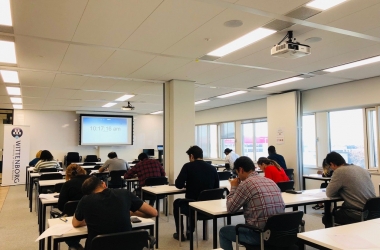Paper Written by Wittenborg Staff Members Published by International Peer-Reviewed Journal

Study Analyses How Lecturers Assess Students
To better understand how lecturers of Dutch universities of applied sciences design assessments and examine students, two Wittenborg staff members and a lecturer from the University of Brighton co-wrote a study that was recently published by international peer-reviewed journal ‘Quality in Higher Education’. Titled ‘Learning-outcomes-based Assessments at Universities of Applied Sciences in the Netherlands: Perceptions of Business Lecturers’, the paper is authored by Wittenborg Head of the School of Business Rauf Abdul, Assurance of Learning Manager Kriszta Kaspers-Rostas and University of Brighton’s Principal Lecturer in Learning and Teaching in Higher Education John Canning.
As explained in the paper’s introduction, the research was motivated by concerns that emerged in the 2010s about the quality of assessments in certain universities of applied sciences. In response to that, the Netherlands Association of Universities of Applied Sciences (Vereniging Hogescholen) set up the External Validity Committee, which subsequently published a report that contained recommendations regarding assessment procedures and also stressed the importance of external validation.
Abdul highlights that it is crucial for higher education institutions (HEIs) to ensure that students achieve the established learning outcomes at the end of their programmes. “As part of one of the most international institutions in the Netherlands, we were interested in investigating how this is done at our institution and elsewhere in the country. This really helped us in understanding the best practices in this regard and showed us a few areas where there is room for improvement.”
In order to collect the data used in the study, the authors conducted individual interviews with 19 lecturers from ten diverse Dutch business schools. Among other topics, the interviews addressed how lecturers have adopted practices such as learning-outcomes-based assessments and a constructive alignment approach – both of which connect examination procedures to the overall learning goals of the module or course.
According to Assurance of Learning Manager Kriszta Kaspers-Rostas, by adopting a constructive alignment approach, lecturers and institutions have the opportunity to identify the discrepancies that arise between intended learning objectives and the achieved learning outcomes. She adds that if jobs require certain competencies from graduates, such as interpersonal communication, problem-solving skills and critical thinking, schools can correctly identify them and formulate the right learning objectives, but also need to develop the right instruments to measure these goals.
“This is important for the quality of teaching and learning, since if the integration is not done in a proper manner, we will be using the wrong testing instruments. One clear example is when, in traditional testing methods, the knowledge of the students is what is being primarily tested while their skills are overlooked, which is the opposite of what job markets are interested in.”
Need for Professional Development
The study finds that the most commonly used examination types in universities of applied sciences are closed-book invigilated written examinations, assignments and project work, followed by open-book invigilated written examinations – during which students are allowed to consult textbooks – and oral presentations. Respondents have expressed different opinions regarding the contribution of assessment methods in reaching the module intended learning outcomes and the programme’s final qualifications, with only 30% being able to clearly see a link and connect their assessments to the intended learning outcomes.
Moreover, although the research underscores that there is a systemic approach used across Dutch higher education institutions, the paper concludes that the recommendations concerning the improvement of assessments are not yet embedded into the culture and mindset of all those who teach and assess business students.
“While there is no claim that universities of applied sciences have failed to embed these processes into their central quality assurance practices, the lack of awareness about outcome-based assessment amongst some assessors needs to be investigated further. This would probably be best achieved through the professional development of staff via formal courses. Luckily, our lecturers at Wittenborg are clearly aware and continuously developing assessment practices that are in line with guidelines and support provided by the exam committee and the school’s Graduation & Examination Board,” Abdul stresses.
WUP 20/09/2022
by Ulisses Sawczuk
©WUAS Press